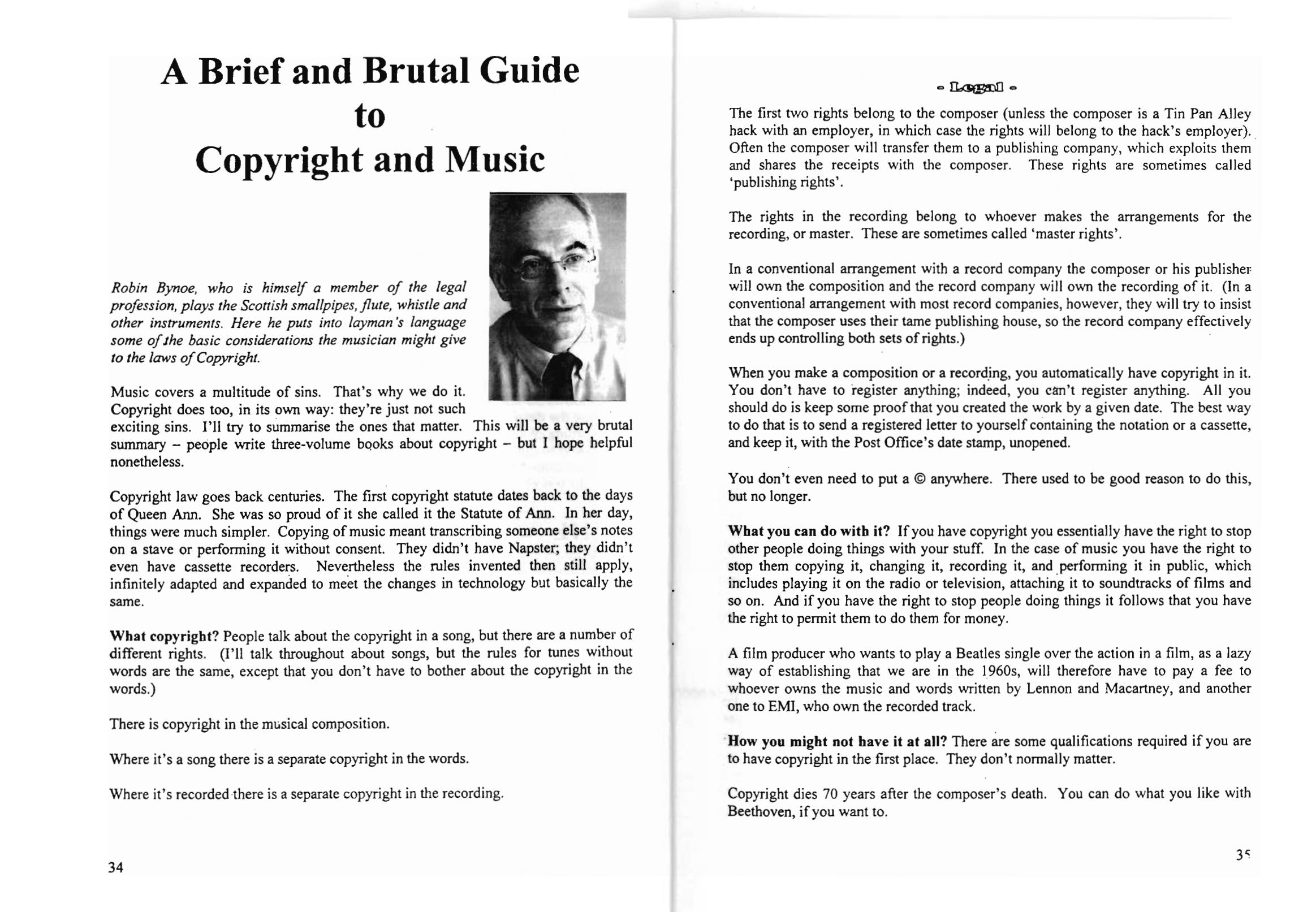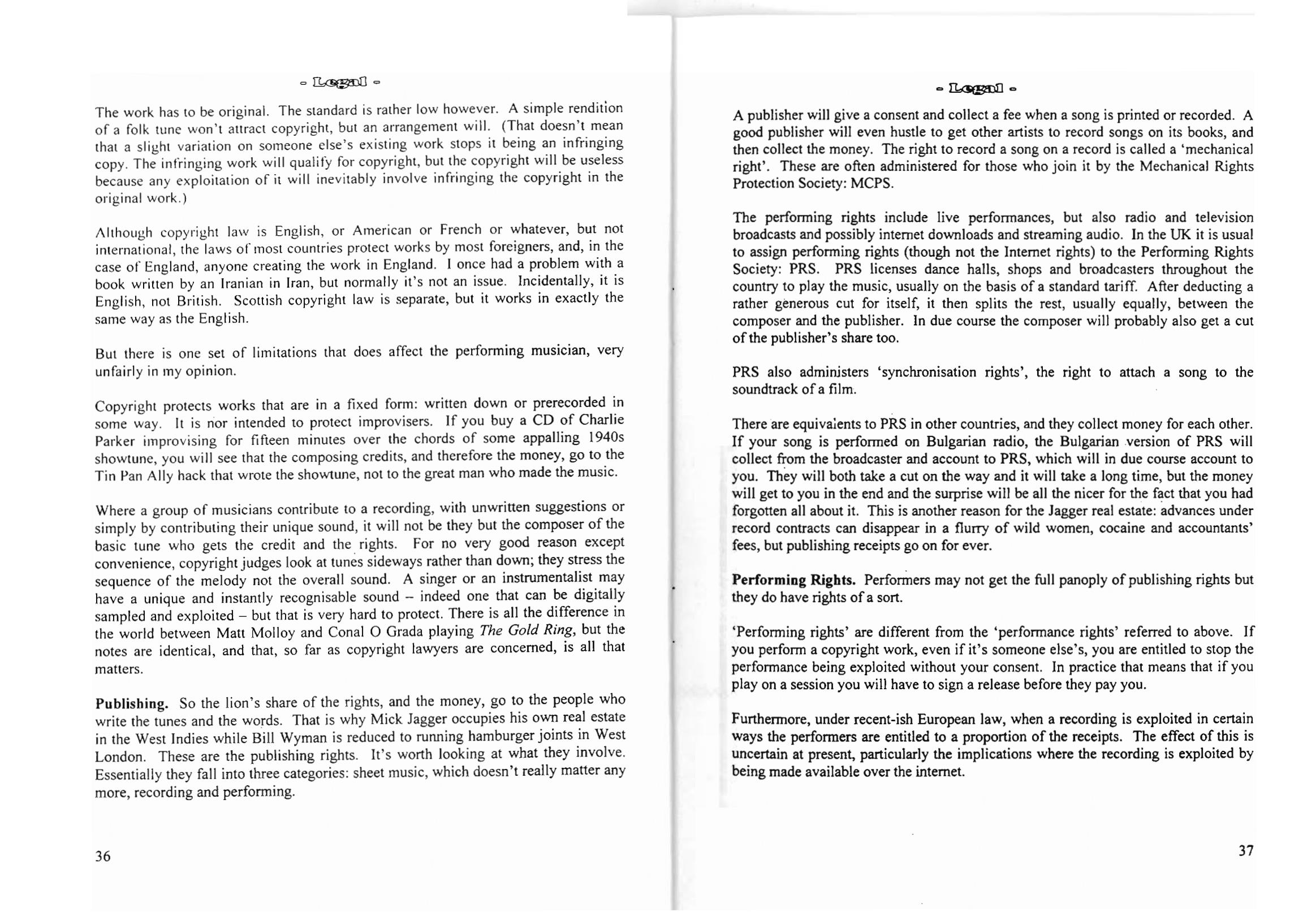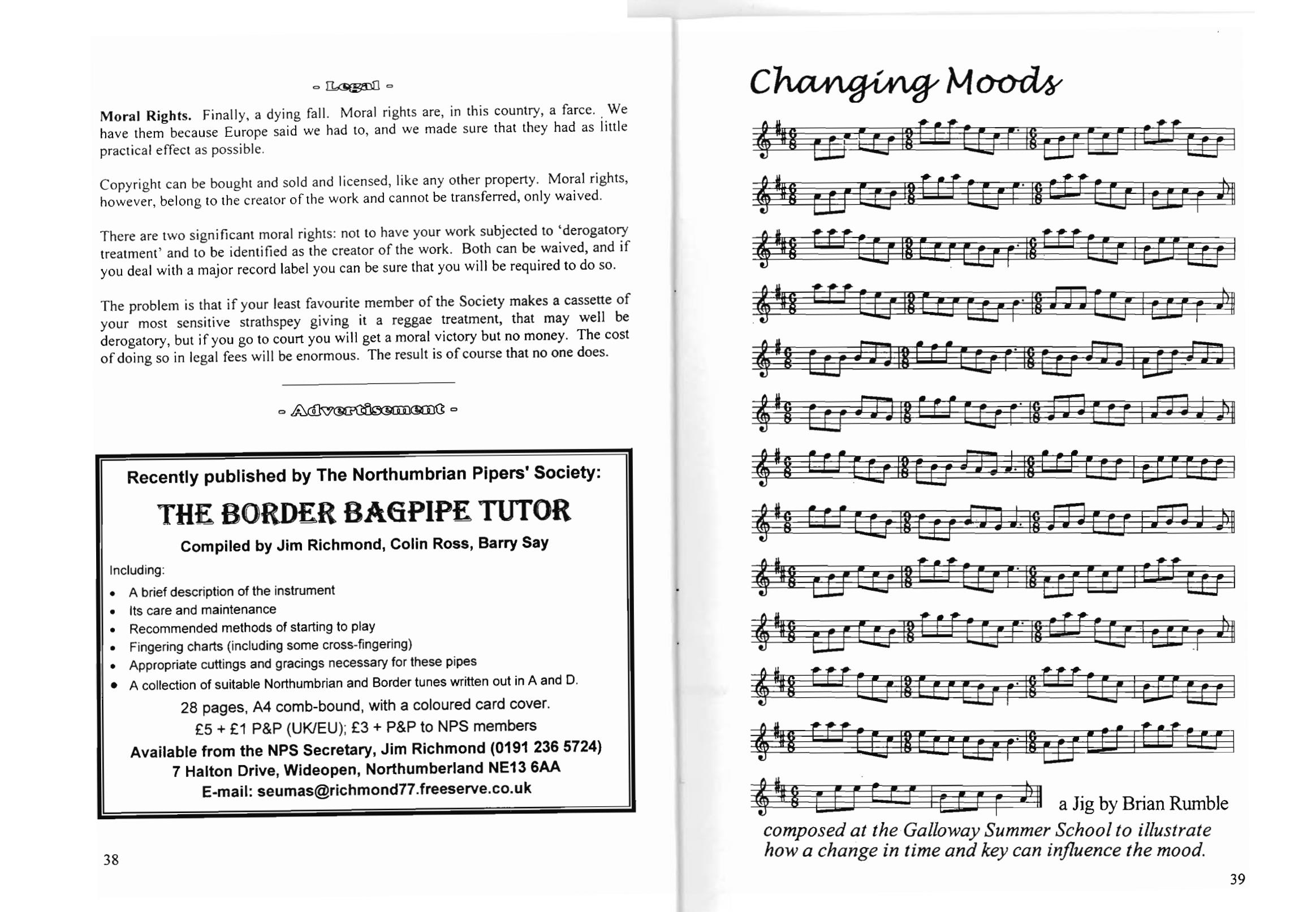A Brief and Brutal Guide to Copyright and Music



Copyright and Music
Robin Bynoe, who is himself a member of the legal profession, plays the Scottish smallpipes, flute, whistle and other instruments. Here he puts into layman's language some of the basic considerations the musician might give to the laws of Copyright.
Music covers a multitude of sins. That’s why we do it. Copyright does too, in its own way: they’re just not such exciting sins. I’ll try to summarise the ones that matter.
Copyright law goes back centuries. The first copyright statute dates back to the days of Queen Ann. She was so proud of it she called it the Statute of Ann. In her day, things were much simpler. Copying of music meant transcribing someone else’s notes on a stave or performing it without consent. They didn’t have Napster; they didn’t even have cassette recorders. Nevertheless the rules invented then still apply, infinitely adapted and expanded to meet the changes in technology but basically the same.
What copyright? People talk about the copyright in a song, but there are a number of different rights. (I’ll talk throughout about songs, but the rules for tunes without words are the same, except that you don’t have to bother about the copyright in the words.)
There is copyright in the musical composition.
Where it’s a song there is a separate copyright in the words.
Where it’s recorded there is a separate copyright in the recording.
The first two rights belong to the composer (unless the composer is a Tin Pan Alley hack with an employer, in which case the rights will belong to the hack’s employer). Often the composer will transfer them to a publishing company, which exploits them and shares the receipts with the composer. These rights are sometimes called ‘publishing rights’.
The rights in the recording belong to whoever makes the arrangements for the recording, or master. These are sometimes called ‘master rights’.
In a conventional arrangement with a record company the composer or his publisher will own the composition and the record company will own the recording of it. (In a conventional arrangement with most record companies, however, they will try to insist that the composer uses their tame publishing house, so the record company effectively ends up controlling both sets of rights.)
When you make a composition or a recording, you automatically have copyright in it. You don’t have to register anything; indeed, you can’t register anything. All you should do is keep some proof that you created the work by a given date. The best way to do that is to send a registered letter to yourself containing the notation or a cassette, and keep it, with the Post Office’s date stamp, unopened.
You don’t even need to put a © anywhere. There used to be good reason to do this, but no longer.
What you can do with it? If you have copyright you essentially have the right to stop other people doing things with your stuff. In the case of music you have the right to stop them copying it, changing it, recording it, and performing it in public, which includes playing it on the radio or television, attaching it to soundtracks of films and so on. And if you have the right to stop people doing things it follows that you have the right to permit them to do them for money.
A film producer who wants to play a Beatles single over the action in a film, as a lazy way of establishing that we are in the 1960s, will therefore have to pay a fee to whoever owns the music and words written by Lennon and Macartney, and another one to EMI, who own the recorded track.
How you might not have it at all? There are some qualifications required if you are to have copyright in the first place. They don’t normally matter.
Copyright dies 70 years after the composer’s death. You can do what you like with Beethoven, if you want to.
The work has to be original. The standard is rather low however. A simple rendition of a folk tune won’t attract copyright, but an arrangement will. (That doesn’t mean that a slight variation on someone else’s existing work stops it being an infringing copy. The infringing work will qualify for copyright, but the copyright will be useless because any exploitation of it will inevitably involve infringing the copyright in the original work.)
Although copyright law is English, or American or French or whatever, but not international, the laws of most countries protect works by most foreigners, and, in the case of England, anyone creating the work in England. I once had a problem with a book written by an Iranian in Iran, but normally it’s not an issue. Incidentally, it is English, not British. Scottish copyright law is separate, but it works in exactly the same way as the English.
But there is one set of limitations that does affect the performing musician, very unfairly in my opinion.
Copyright protects works that are in a fixed form: written down or prerecorded in some way. It is nor intended to protect improvisers. If you buy a CD of Charlie Parker improvising for fifteen minutes over the chords of some appalling 1940s showtune, you will see that the composing credits, and therefore the money, go to the Tin Pan Ally hack that wrote the showtune, not to the great man who made the music.
Where a group of musicians contribute to a recording, with unwritten suggestions or simply by contributing their unique sound, it will not be they but the composer of the basic tune who gets the credit and the rights. For no very good reason except convenience, copyright judges look at tunes sideways rather than down; they stress the sequence of the melody not the overall sound. A singer or an instrumentalist may have a unique and instantly recognisable sound - indeed one that can be digitally sampled and exploited - but that is very hard to protect. There is all the difference in the world between Matt Molloy and Conal O Grada playing The Gold Ring, but the notes are identical, and that, so far as copyright lawyers are concerned, is all that matters.
Publishing. So the lion’s share of the rights, and the money, go to the people who write the tunes and the words. That is why Mick Jagger occupies his own real estate in the West Indies while Bill Wyman is reduced to running hamburger joints in West London. These are the publishing rights. It’s worth looking at what they involve. Essentially they fall into three categories: sheet music, which doesn’t really matter any more, recording and performing.
A publisher will give a consent and collect a fee when a song is printed or recorded. A good publisher will even hustle to get other artists to record songs on its books, and then collect the money. The right to record a song on a record is called a ‘mechanical right’. These are often administered for those who join it by the Mechanical Rights Protection Society: MCPS.
The performing rights include live performances, but also radio and television broadcasts and possibly internet downloads and streaming audio. In the UK it is usual to assign performing rights (though not the Internet rights) to the Performing Rights Society: PRS. PRS licenses dance halls, shops and broadcasters throughout the country to play the music, usually on the basis of a standard tariff. After deducting a rather generous cut for itself, it then splits the rest, usually equally, between the composer and the publisher. In due course the composer will probably also get a cut of the publisher’s share too.
PRS also administers ‘synchronisation rights’, the right to attach a song to the soundtrack of a film.
There are equivalents to PRS in other countries, and they collect money for each other. If your song is performed on Bulgarian radio, the Bulgarian version of PRS will collect from the broadcaster and account to PRS, which will in due course account to you. They will both take a cut on the way and it will take a long time, but the money will get to you in the end and the surprise will be all the nicer for the fact that you had forgotten all about it. This is another reason for the Jagger real estate: advances under record contracts can disappear in a flurry of wild women, cocaine and accountants’ fees, but publishing receipts go on for ever.
Performing Rights. Performers may not get the full panoply of publishing rights but they do have rights of a sort.
‘Performing rights’ are different from the ‘performance rights’ referred to above. If you perform a copyright work, even if it’s someone else’s, you are entitled to stop the performance being exploited without your consent. In practice that means that if you play on a session you will have to sign a release before they pay you.
Furthermore, under recent-ish European law, when a recording is exploited in certain ways the performers are entitled to a proportion of the receipts. The effect of this is uncertain at present, particularly the implications where the recording is exploited by being made available over the internet.
Moral Rights. Finally, a dying fall. Moral rights are, in this country, a farce. Weave them because Europe said we had to, and we made sure that they had as little practical effect as possible.
Copyright can be bought and sold and licensed, like any other property. Moral rights, however, belong to the creator of the work and cannot be transferred, only waived.
There are two significant moral rights: not to have your work subjected to ‘derogatory treatment’ and to be identified as the creator of the work. Both can be waived, and if you deal with a major record label you can be sure that you will be required to do so.
The problem is that if your least favourite member of the Society makes a cassette of your most sensitive strathspey giving it a reggae treatment, that may well be derogatory, but if you go to court you will get a moral victory but no money. The cost of doing so in legal fees will be enormous. The result is of course that no one does.
